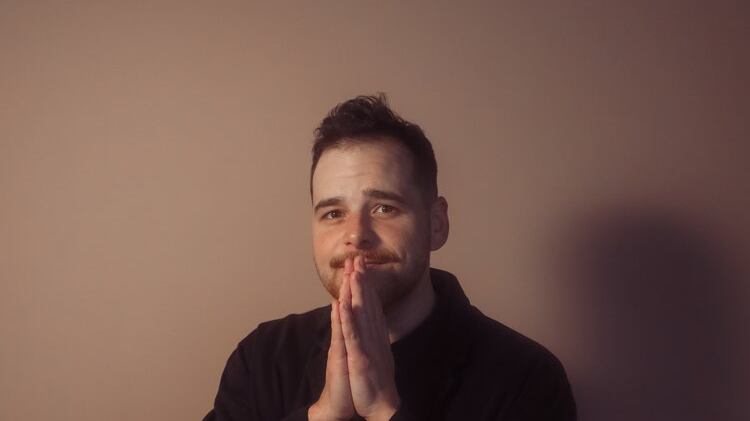We’ve all heard the cliché that music is therapy, so what happens when a therapist creates music? The answer can be found in the new album by Layperson, the project of Portland musician Julian Morris.
Recorded over a period of nearly three years, Massive Leaning (due out Nov. 10), grew out of a feeling of overwhelming grief that resulted from the worst breakup of Morris’ life. This intensely personal experience resulted in an album filled with resonant, timeless emotions.
“There’s a therapist I love who’s really influential named Carl Rogers, and he has this quote: ‘What is most personal is most universal,’” Morris says. “If you dig deep enough into your own experience, it’s bound to hit somebody else.”
A lot of other things happened during that time too: the pandemic, Morris’ journey through graduate school (which ultimately led to his career as a therapist), and a deep dive into meditation. He even moved into a Buddhist collective in North Portland, gaining not just a more focused approach to the lifestyle, but also an audience to share his songs with.
All of these experiences came together in a musical vision that’s one of the most impressive Portland releases this year. Despite the dark point in time at which it was written and recorded, Massive Leaning feels like a hopeful work of psychedelia-laced indie pop. Morris admits that being a therapist “can help and it can also get in the way if you overinterpret yourself,” and the album feels like a swirling combination of cathartic moments alongside poetic self-analysis.
“I do a lot of therapy that’s rooted in existentialism, which is really about figuring out what the base experience is of the moment,” Morris says. “If I’m really present and I really dig down, I might find out what’s happening here. Or, what am I using to get away from here and how can I come back? I have a few clients that I know have listened to my music, and I don’t think they’re necessarily surprised by what they hear because I am pretty raw and I really try to just be myself.”
When it came to crafting songs, Morris took his time as he experimented with new sounds and layered in different instruments. He plays most of the parts by himself, but he also made the wise choice to incorporate the dreamy pedal steel playing of his friend Sam Wenc as well as a few other musicians contributing drums and clarinet. But it’s the pedal steel that really stands out on songs like the ridiculously catchy title track, the airy Americana-meets-indie on “Black Pool,” and the Tom Petty-esque “My Loneliness Rings Like a Bell.”
While Morris cites artists like Fleetwood Mac and Sam Evian as influences, the music on Massive Leaning also brings to mind the rich production of acts like The Shins, Lord Huron, and Jim James. The sheer musicality of each song is accentuated by Morris’ bright harmonies, inducing a rush of excitement as you marvel at how an artist could translate such a painful experience into a sound so euphoric and infectious.
Reflecting on the album’s departure from his folkier early material, Morris says, “From a production standpoint, it’s just really dense. There’s a lot of instrumentation. With vocal layering, I went really hard on this album and came up with a lot of different parts. It’s a big kind of fat sound, more so than other records I’ve made.”
At its core, Massive Leaning is essentially a breakup album, but one that is far more complex and nuanced than what we associate with that style. For Morris, writing and recording is a form of therapy that he hopes can guide listeners through their own grief.
“I think I’m just aware in this moment of how strange it is to put four years of your life into something and just let go of it,” he says. “I hope that people connect with it.”
SEE IT: Layperson, Corinne Sharlet and Alex Crowson play Laurelthirst Public House, 2958 NE Glisan St., 503-232-1504, laurelthirst.com. 9 pm Saturday, Nov. 18. $10.

